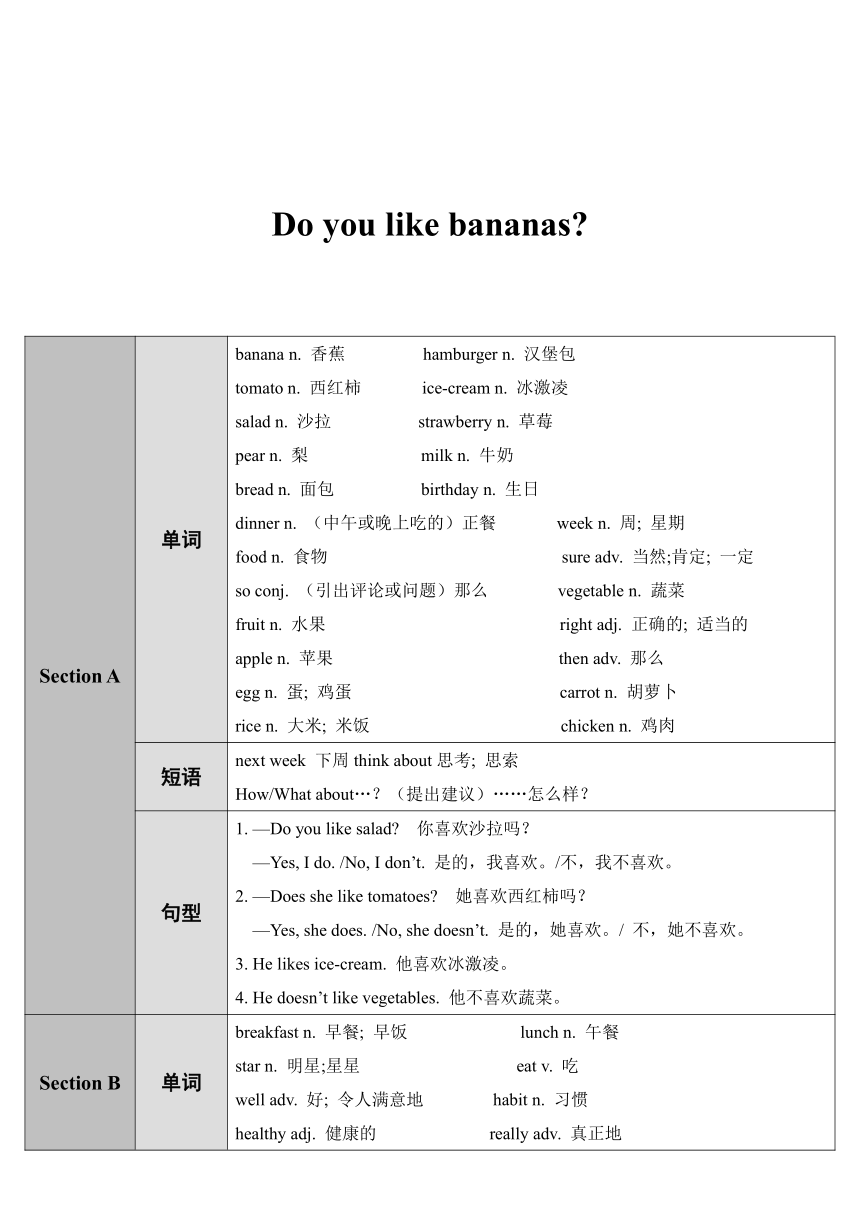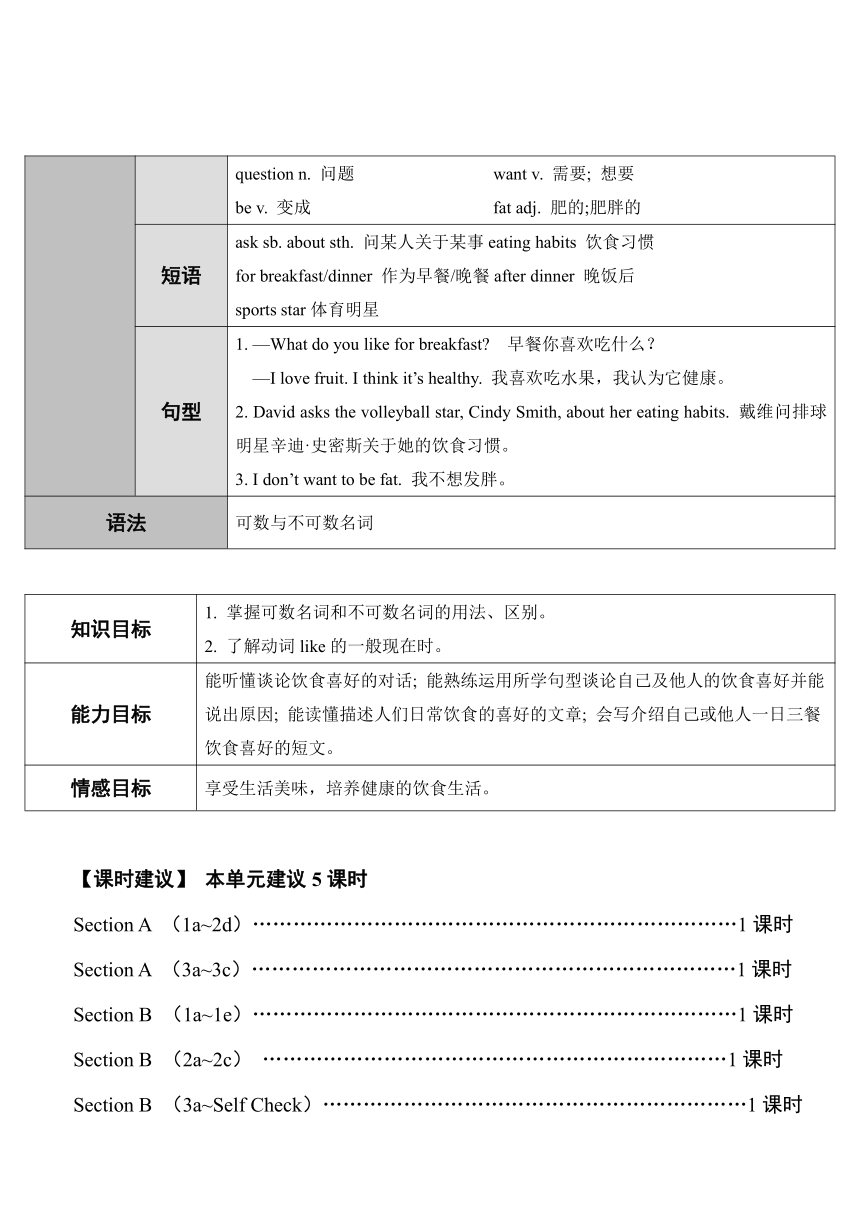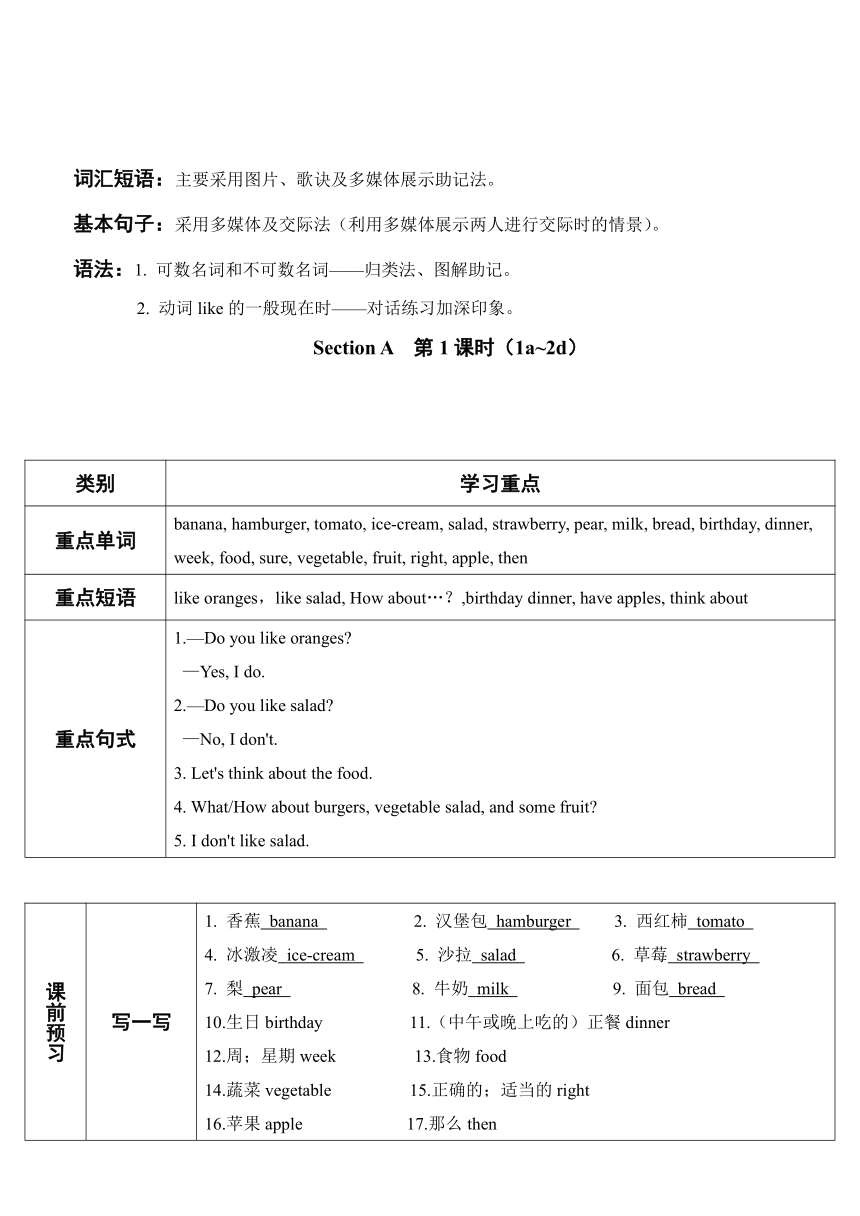人教版 Unit 6 Do you like bananas? Section A 教案
文档属性
| 名称 | 人教版 Unit 6 Do you like bananas? Section A 教案 |  | |
| 格式 | doc | ||
| 文件大小 | 61.5KB | ||
| 资源类型 | 教案 | ||
| 版本资源 | 人教新目标(Go for it)版 | ||
| 科目 | 英语 | ||
| 更新时间 | 2022-07-18 21:58:01 | ||
图片预览



文档简介
Do you like bananas
Section A 单词 banana n. 香蕉 hamburger n. 汉堡包tomato n. 西红柿 ice-cream n. 冰激凌salad n. 沙拉 strawberry n. 草莓pear n. 梨 milk n. 牛奶bread n. 面包 birthday n. 生日dinner n. (中午或晚上吃的)正餐 week n. 周; 星期food n. 食物 sure adv. 当然;肯定; 一定so conj. (引出评论或问题)那么 vegetable n. 蔬菜fruit n. 水果 right adj. 正确的; 适当的 apple n. 苹果 then adv. 那么egg n. 蛋; 鸡蛋 carrot n. 胡萝卜rice n. 大米; 米饭 chicken n. 鸡肉
短语 next week 下周think about思考; 思索How/What about…?(提出建议)……怎么样?
句型 1. —Do you like salad 你喜欢沙拉吗?—Yes, I do. /No, I don’t. 是的,我喜欢。/不,我不喜欢。2. —Does she like tomatoes 她喜欢西红柿吗?—Yes, she does. /No, she doesn’t. 是的,她喜欢。/ 不,她不喜欢。3. He likes ice-cream. 他喜欢冰激凌。4. He doesn’t like vegetables. 他不喜欢蔬菜。
Section B 单词 breakfast n. 早餐; 早饭 lunch n. 午餐star n. 明星;星星 eat v. 吃well adv. 好; 令人满意地 habit n. 习惯healthy adj. 健康的 really adv. 真正地question n. 问题 want v. 需要; 想要be v. 变成 fat adj. 肥的;肥胖的
短语 ask sb. about sth. 问某人关于某事eating habits 饮食习惯for breakfast/dinner 作为早餐/晚餐after dinner 晚饭后sports star体育明星
句型 1. —What do you like for breakfast 早餐你喜欢吃什么?—I love fruit. I think it’s healthy. 我喜欢吃水果,我认为它健康。2. David asks the volleyball star, Cindy Smith, about her eating habits. 戴维问排球明星辛迪·史密斯关于她的饮食习惯。3. I don’t want to be fat. 我不想发胖。
语法 可数与不可数名词
知识目标 1. 掌握可数名词和不可数名词的用法、区别。2. 了解动词like的一般现在时。
能力目标 能听懂谈论饮食喜好的对话; 能熟练运用所学句型谈论自己及他人的饮食喜好并能说出原因; 能读懂描述人们日常饮食的喜好的文章; 会写介绍自己或他人一日三餐饮食喜好的短文。
情感目标 享受生活美味,培养健康的饮食生活。
【课时建议】 本单元建议5课时
Section A (1a~2d)………………………………………………………………1课时
Section A (3a~3c)………………………………………………………………1课时
Section B (1a~1e)………………………………………………………………1课时
Section B (2a~2c) ……………………………………………………………1课时
Section B (3a~Self Check)………………………………………………………1课时
词汇短语:主要采用图片、歌诀及多媒体展示助记法。
基本句子:采用多媒体及交际法(利用多媒体展示两人进行交际时的情景)。
语法:1. 可数名词和不可数名词——归类法、图解助记。
2. 动词like的一般现在时——对话练习加深印象。
Section A 第1课时(1a~2d)
类别 学习重点
重点单词 banana, hamburger, tomato, ice-cream, salad, strawberry, pear, milk, bread, birthday, dinner, week, food, sure, vegetable, fruit, right, apple, then
重点短语 like oranges,like salad, How about…?,birthday dinner, have apples, think about
重点句式 1.—Do you like oranges —Yes, I do.2.—Do you like salad —No, I don't.3. Let's think about the food.4. What/How about burgers, vegetable salad, and some fruit 5. I don't like salad.
课前预习 写一写 1. 香蕉 banana 2. 汉堡包 hamburger 3. 西红柿 tomato 4. 冰激凌 ice-cream 5. 沙拉 salad 6. 草莓 strawberry 7. 梨 pear 8. 牛奶 milk 9. 面包 bread 10.生日birthday 11.(中午或晚上吃的)正餐dinner12.周;星期week 13.食物food14.蔬菜vegetable 15.正确的;适当的right16.苹果apple 17.那么then
译一译 1.喜欢沙拉like salad 2.怎么样what/how about3.生日晚宴birthday dinner 4.吃苹果have apples5.考虑think about
背一背 1.—你喜欢橙子吗?—是的,我喜欢。/不,我不喜欢。—Do you like oranges —Yes, I do./No, I don't.2.让我们来想想(吃什么)食物吧。Let's think about the food.3.汉堡包、蔬菜沙拉和一些水果怎么样?What/How about hamburgers, vegetable salad and some fruit
新课导入 1. 教师准备好一些食物,如:tomato, banana, pear等,然后与学生谈论食物。T: What’s this S: It’s a tomato. (学生预习过这个生词。)T: Do you like it S: Yes, I do. /No, I don’t. 2. 用其他食物重复对话。教师对学生的发音错误给予纠正。3. 学生利用实物或图片向教师提问。
新课展示 【完成教材1a~2d的教学任务】1. 教学1a。教师让学生读1a中的单词,注意学生的发音,如有错误及时纠正。2. 让学生看图,然后将单词与图中的物品配对。(最好能使用多媒体课件,这样效果更好。)3. 读记单词。 4. 教学1b。听1b录音,为对话编号。5. 放1b录音,让学生跟读对话。6. 教学1c。学生根据1a中的物品模仿1b中的对话, 编造新的对话并表演。7.教学2a。听2a录音,在表中圈出所听到的食物。8.教学2b。再听录音,填写2b中的空缺。9.再听录音,学生跟读。10.教学2c。学生分小组练习2b中的对话,并谈谈自己真实的学习情况。11.学生读2d的对话,回答下列问题:(1)What does John like (2)Whose(谁) birthday is next week (3)What will(将) they have 12.教师根据学生理解情况,讲解对话中的重难点。【语法提要】1. 询问某人的喜好,常用句型:Do/Does +主语 + like + …?意思是“某人喜欢……吗?”其肯定回答用:Yes,主语+ do/does;否定回答用:No,主语 + don’t/doesn’t. 。2. like是及物动词,意为“喜欢”。like + sb./sth. /doing sth. /to do sth. 意为“喜欢某人/某物/做某事”。 后可以接very much, a lot, a little, not…at all等表程度的词。例句:Jerry likes Chinese food very much. 杰里非常喜欢中国的食物。 I like soccer and volleyball a little. 我有点喜欢足球和排球。 Meimei doesn’t like junk food at all. 梅梅一点都不喜欢垃圾食品。3.think about意为“考虑;思考”,think为不及物动词,常与介词about连用,其后可接名词、代词或动词-ing 形式。例句:Let's think about the next week's trip.咱们考虑一下下周的旅行。(接名词) I'm thinking about it.我正在考虑这件事。(接代词)I'm thinking about moving somewhere warm. 我正考虑着搬到暖和的地方去。(接动词-ing形式)4.How about… 意为“……怎么样?”用于提出建议或请求,相当于“What about… ”其中about为介词,其后可接名词、代词或动词-ing形式。例句:We're hungry. How about some bread 我们饿了,吃点面包怎么样?(接名词)How about him 他怎么样?(接代词)How about having some fruit 吃些水果怎么样?(接动词-ing形式)拓展:英语中常用于提建议的句型还有:(1)Let's… 意为“让我们……吧”。例句:Let's have some apples.让我们吃些苹果吧。(2)Why not… 意为“为什么不……呢?”例句:Why not ask our teacher 为什么不问我们的老师呢?
活学活练 ( B )1. —________these your photos —Yes. ________you like A. Do, Do, them B. Are, Do, themC. Are, Are, it D. Do, Are, them( C )2. Bob ________ oranges, but Bill ________ them. A. like, don’t like B. like, doesn’t likeC. likes, doesn’t like D. likes, don’t like3.—How/What about(…怎样) having some pears —Sure(当然).4. She doesn't like(不喜欢)eggs.
布置作业:教师引导学生课后完成本课时对应练习,并预习下一课时内容。
教学反思 本课时所学的食品名词有些难记,同时提醒学生注意区分可数名词和不可数名词。
教学过程中老师的疑问:
教师点评和总结:
PAGE
Section A 单词 banana n. 香蕉 hamburger n. 汉堡包tomato n. 西红柿 ice-cream n. 冰激凌salad n. 沙拉 strawberry n. 草莓pear n. 梨 milk n. 牛奶bread n. 面包 birthday n. 生日dinner n. (中午或晚上吃的)正餐 week n. 周; 星期food n. 食物 sure adv. 当然;肯定; 一定so conj. (引出评论或问题)那么 vegetable n. 蔬菜fruit n. 水果 right adj. 正确的; 适当的 apple n. 苹果 then adv. 那么egg n. 蛋; 鸡蛋 carrot n. 胡萝卜rice n. 大米; 米饭 chicken n. 鸡肉
短语 next week 下周think about思考; 思索How/What about…?(提出建议)……怎么样?
句型 1. —Do you like salad 你喜欢沙拉吗?—Yes, I do. /No, I don’t. 是的,我喜欢。/不,我不喜欢。2. —Does she like tomatoes 她喜欢西红柿吗?—Yes, she does. /No, she doesn’t. 是的,她喜欢。/ 不,她不喜欢。3. He likes ice-cream. 他喜欢冰激凌。4. He doesn’t like vegetables. 他不喜欢蔬菜。
Section B 单词 breakfast n. 早餐; 早饭 lunch n. 午餐star n. 明星;星星 eat v. 吃well adv. 好; 令人满意地 habit n. 习惯healthy adj. 健康的 really adv. 真正地question n. 问题 want v. 需要; 想要be v. 变成 fat adj. 肥的;肥胖的
短语 ask sb. about sth. 问某人关于某事eating habits 饮食习惯for breakfast/dinner 作为早餐/晚餐after dinner 晚饭后sports star体育明星
句型 1. —What do you like for breakfast 早餐你喜欢吃什么?—I love fruit. I think it’s healthy. 我喜欢吃水果,我认为它健康。2. David asks the volleyball star, Cindy Smith, about her eating habits. 戴维问排球明星辛迪·史密斯关于她的饮食习惯。3. I don’t want to be fat. 我不想发胖。
语法 可数与不可数名词
知识目标 1. 掌握可数名词和不可数名词的用法、区别。2. 了解动词like的一般现在时。
能力目标 能听懂谈论饮食喜好的对话; 能熟练运用所学句型谈论自己及他人的饮食喜好并能说出原因; 能读懂描述人们日常饮食的喜好的文章; 会写介绍自己或他人一日三餐饮食喜好的短文。
情感目标 享受生活美味,培养健康的饮食生活。
【课时建议】 本单元建议5课时
Section A (1a~2d)………………………………………………………………1课时
Section A (3a~3c)………………………………………………………………1课时
Section B (1a~1e)………………………………………………………………1课时
Section B (2a~2c) ……………………………………………………………1课时
Section B (3a~Self Check)………………………………………………………1课时
词汇短语:主要采用图片、歌诀及多媒体展示助记法。
基本句子:采用多媒体及交际法(利用多媒体展示两人进行交际时的情景)。
语法:1. 可数名词和不可数名词——归类法、图解助记。
2. 动词like的一般现在时——对话练习加深印象。
Section A 第1课时(1a~2d)
类别 学习重点
重点单词 banana, hamburger, tomato, ice-cream, salad, strawberry, pear, milk, bread, birthday, dinner, week, food, sure, vegetable, fruit, right, apple, then
重点短语 like oranges,like salad, How about…?,birthday dinner, have apples, think about
重点句式 1.—Do you like oranges —Yes, I do.2.—Do you like salad —No, I don't.3. Let's think about the food.4. What/How about burgers, vegetable salad, and some fruit 5. I don't like salad.
课前预习 写一写 1. 香蕉 banana 2. 汉堡包 hamburger 3. 西红柿 tomato 4. 冰激凌 ice-cream 5. 沙拉 salad 6. 草莓 strawberry 7. 梨 pear 8. 牛奶 milk 9. 面包 bread 10.生日birthday 11.(中午或晚上吃的)正餐dinner12.周;星期week 13.食物food14.蔬菜vegetable 15.正确的;适当的right16.苹果apple 17.那么then
译一译 1.喜欢沙拉like salad 2.怎么样what/how about3.生日晚宴birthday dinner 4.吃苹果have apples5.考虑think about
背一背 1.—你喜欢橙子吗?—是的,我喜欢。/不,我不喜欢。—Do you like oranges —Yes, I do./No, I don't.2.让我们来想想(吃什么)食物吧。Let's think about the food.3.汉堡包、蔬菜沙拉和一些水果怎么样?What/How about hamburgers, vegetable salad and some fruit
新课导入 1. 教师准备好一些食物,如:tomato, banana, pear等,然后与学生谈论食物。T: What’s this S: It’s a tomato. (学生预习过这个生词。)T: Do you like it S: Yes, I do. /No, I don’t. 2. 用其他食物重复对话。教师对学生的发音错误给予纠正。3. 学生利用实物或图片向教师提问。
新课展示 【完成教材1a~2d的教学任务】1. 教学1a。教师让学生读1a中的单词,注意学生的发音,如有错误及时纠正。2. 让学生看图,然后将单词与图中的物品配对。(最好能使用多媒体课件,这样效果更好。)3. 读记单词。 4. 教学1b。听1b录音,为对话编号。5. 放1b录音,让学生跟读对话。6. 教学1c。学生根据1a中的物品模仿1b中的对话, 编造新的对话并表演。7.教学2a。听2a录音,在表中圈出所听到的食物。8.教学2b。再听录音,填写2b中的空缺。9.再听录音,学生跟读。10.教学2c。学生分小组练习2b中的对话,并谈谈自己真实的学习情况。11.学生读2d的对话,回答下列问题:(1)What does John like (2)Whose(谁) birthday is next week (3)What will(将) they have 12.教师根据学生理解情况,讲解对话中的重难点。【语法提要】1. 询问某人的喜好,常用句型:Do/Does +主语 + like + …?意思是“某人喜欢……吗?”其肯定回答用:Yes,主语+ do/does;否定回答用:No,主语 + don’t/doesn’t. 。2. like是及物动词,意为“喜欢”。like + sb./sth. /doing sth. /to do sth. 意为“喜欢某人/某物/做某事”。 后可以接very much, a lot, a little, not…at all等表程度的词。例句:Jerry likes Chinese food very much. 杰里非常喜欢中国的食物。 I like soccer and volleyball a little. 我有点喜欢足球和排球。 Meimei doesn’t like junk food at all. 梅梅一点都不喜欢垃圾食品。3.think about意为“考虑;思考”,think为不及物动词,常与介词about连用,其后可接名词、代词或动词-ing 形式。例句:Let's think about the next week's trip.咱们考虑一下下周的旅行。(接名词) I'm thinking about it.我正在考虑这件事。(接代词)I'm thinking about moving somewhere warm. 我正考虑着搬到暖和的地方去。(接动词-ing形式)4.How about… 意为“……怎么样?”用于提出建议或请求,相当于“What about… ”其中about为介词,其后可接名词、代词或动词-ing形式。例句:We're hungry. How about some bread 我们饿了,吃点面包怎么样?(接名词)How about him 他怎么样?(接代词)How about having some fruit 吃些水果怎么样?(接动词-ing形式)拓展:英语中常用于提建议的句型还有:(1)Let's… 意为“让我们……吧”。例句:Let's have some apples.让我们吃些苹果吧。(2)Why not… 意为“为什么不……呢?”例句:Why not ask our teacher 为什么不问我们的老师呢?
活学活练 ( B )1. —________these your photos —Yes. ________you like A. Do, Do, them B. Are, Do, themC. Are, Are, it D. Do, Are, them( C )2. Bob ________ oranges, but Bill ________ them. A. like, don’t like B. like, doesn’t likeC. likes, doesn’t like D. likes, don’t like3.—How/What about(…怎样) having some pears —Sure(当然).4. She doesn't like(不喜欢)eggs.
布置作业:教师引导学生课后完成本课时对应练习,并预习下一课时内容。
教学反思 本课时所学的食品名词有些难记,同时提醒学生注意区分可数名词和不可数名词。
教学过程中老师的疑问:
教师点评和总结:
PAGE
同课章节目录
- starters 预备篇(2012秋审查)
- Unit 1 Good morning !
- Unit 2 What’s this in English?
- Unit 3 What color is it ?
- Unit 1 My name's Gina.
- Section A
- Section B
- Unit 2 This is my sister.
- Section A
- Section B
- Unit 3 Is this your pencil?
- Section A
- Section B
- Unit 4 Where's my schoolbag?
- Section A
- Section B
- Unit 5 Do you have a soccer ball?
- Section A
- Section B
- Unit 6 Do you like bananas?
- Section A
- Section B
- Unit 7 How much are these socks?
- Section A
- Section B
- Unit 8 When is your birthday?
- Section A
- Section B
- Unit 9 My favorite subject is science.
- Section A
- Section B
